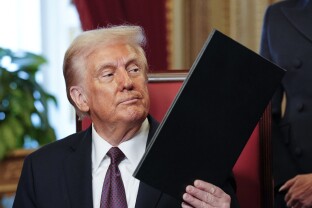Just two days after President Donald Trump delivered a speech at the Justice Department listing out his political enemies, he declared in a midnight post that he had somehow made “VOID” his predecessor’s presidential pardons — a measure that could inch closer to exacting his revenge.
Still raging over the House Jan. 6 Committee, Trump singled out those who served on that temporary panel and threatened to levy criminal charges against them — despite the fact that President Joe Biden pardoned them in the final days of his administration.
Trump claimed that Biden’s use of an electronic signature somehow made it less official.
“The ‘Pardons’ that Sleepy Joe Biden gave to the Unselect Committee of Political Thugs, and many others, are hereby declared VOID, VACANT, AND OF NO FURTHER FORCE OR EFFECT, because of the fact that they were done by Autopen. In other words, Joe Biden did not sign them,” Trump proclaimed on Truth Social at 12:35 a.m. ET.
“Therefore, those on the Unselect Committee… should fully understand that they are subject to investigation at the highest level,” Trump continued, referring to the investigation as a “witch hunt.”
Legal experts say Trump’s threat to ignore a past president’s clemency power, which is enshrined in the Constitution, is yet another ominous first for American history.
Mark Tushnet, a professor emeritus at Harvard Law School who has written extensively on constitutional issues, said Trump’s proclamation has no basis in reality — adding that this “purported ‘revocation’ is the sort of middle-of-the-night tweet that Trump’s subordinates shouldn’t take seriously.”
“As far as I know this has never been attempted before — and it might not be attempted now,” he told NOTUS. “The way it would be tested is this: The government charges one of the people Biden pardoned with a crime covered by the pardon and the defendant asserts the pardon as an affirmative defense. If there’s anything left to the rule of law, that defense would succeed and the prosecution would be dismissed.”
Northeastern University law professor Daniel Urman wrote to NOTUS that he has “never heard of a president trying to revoke or undo his predecessor’s pardon. The pardon power is nearly absolute (except in cases of impeachment) and courts would likely view this attempt with tremendous skepticism.”
Trump’s announcement still set off alarms for legal scholars who have been watching how the Trump administration has quickly tested the Constitution, first by trying to revoke birthright citizenship with the stroke of a pen and then by declaring a state of emergency at the southern border as a pretext for initiating a militarized deportation program. That exercise of executive power has continued with his administration’s gutting of the Justice Department on political grounds, with retaliatory firings of Jan. 6 prosecutors, the ejection of career officials who investigated Trump for criminal activities and the threatened exposure of FBI personnel deemed disloyal. Trump has also placed political ally Kash Patel and steadfast MAGA podcaster Dan Bongino in the top two leadership positions at the FBI, moves his critics see as potentially ushering in an era in which the bureau serves as a law enforcement arm of the president.
Trump has kept active on judicial norms in just the last three days. At the DOJ headquarters on Friday, he decried the criminal investigations conducted by the personnel in that building and gloated about winning a political contest that returned him to a position of authority over those government officials. That was followed on Saturday by a forceful display of law enforcement power in the rushed deportation of Venezuelan immigrants that defied a federal court order. Sunday night’s pardons announcement made it a hat trick.
“Why he might do this? It’s designed to make people scared,” said Jeremy Paul, who until 2018 served as the dean of Northeastern University’s law school. “And there’s the real possibility he could order the FBI to start investigating people who’ve already been pardoned. Would any of these people defy these orders? They might resign or start to do it, in which case, the targets of these investigations would have to go to court and seek an injunction to stop them.”
But any judicial intervention trying to limit law enforcement in this matter would also run into problems, due to the nation’s traditional separation of powers.
Paul, though, said he thinks the pardon dispute is fundamentally a distraction from the government’s deportation actions in defiance of court orders.
“That’s something that he did and it’s a lot worse than this,” Paul said.
—
Jose Pagliery is a reporter at NOTUS.
Sign in
Log into your free account with your email. Don’t have one?
Check your email for a one-time code.
We sent a 4-digit code to . Enter the pin to confirm your account.
New code will be available in 1:00
Let’s try this again.
We encountered an error with the passcode sent to . Please reenter your email.


